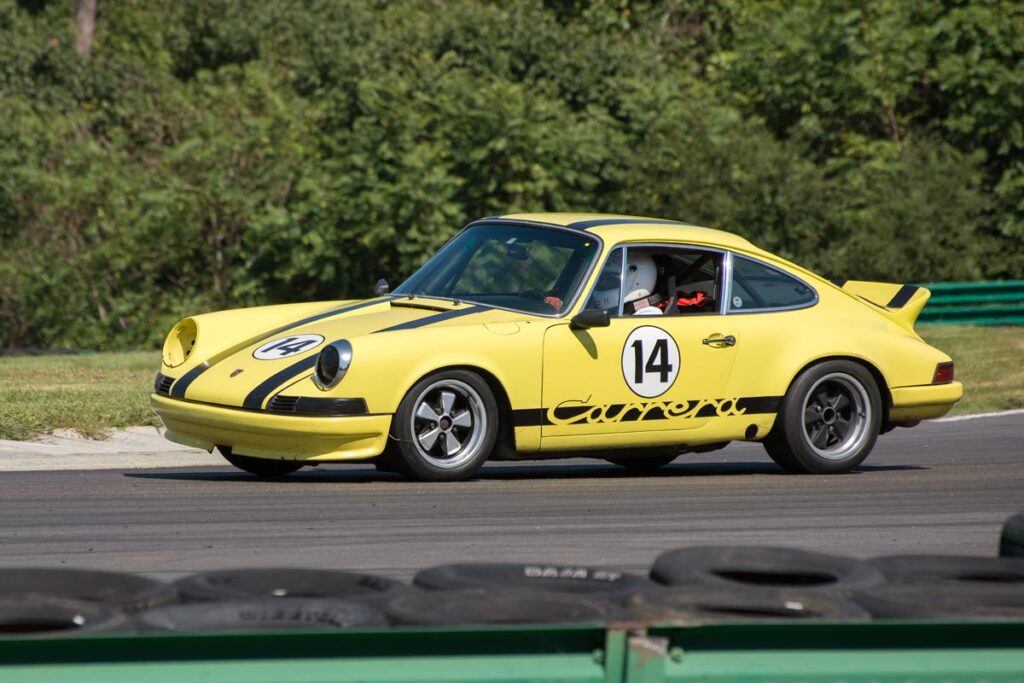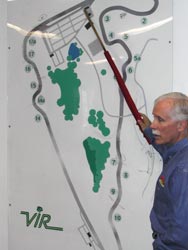HIGH-PERFORMANCE DRIVER EDUCATION
Shenandoah Region drivers regularly participate in PCA high-performance “Driver’s Education” (DE) events at nearby closed road courses such as the Virginia International Raceway (VIR) in Alton, VA and the Summit Point Raceway near Summit Point, WV. A DE can be as fast as a true race, but it is much safer because it is not a competition. When a faster car catches up with a slower one, the lead driver does not try to keep the faster one from passing. Instead, the slower driver is expected to “point by” the faster car, giving permission to pass on the indicated side. This greatly reduces the chances of car-to-car contact.
Although “high performance” means there are no speed limits at DEs, the laws of physics are strictly enforced at all times. Most people are astonished to learn just how capable their Porsches really are, the weakest link usually being the loose nut behind the wheel. Driving well at high speeds and at the limits of traction is not at all intuitive, so beginning drivers are paired with experienced instructors who teach them about car dynamics, traction, smoothness, and “the line” (the best path for getting around the track quickly). Both students and instructors should be patient. Driving well isn’t easy, and most drivers continue to improve with seat time, year after year. The skills learned at a DE can also be valuable on the street in emergency situations (avoiding accidents, recognizing and recovering from dangerous situations, dealing with slippery road surfaces, etc.).


Like serious rock climbing, DE is an adrenaline sport. Experienced drivers find they get “in the zone” at speed, which is simultaneously exhilirating, exhausting, relaxing, and addicting. DE is also an expensive sport. Beginning drivers can borrow or buy a helmet and show up in showroom stock Porsches (or other high-performance car like BMWs, Corvettes, or Mazda Miatas), but as they get faster, they will notice that their brakes overheat and their tires wear out really fast, and they will eventually need to buy brake parts and tires more suited to the track. Most advanced drivers also invest in extra safety equipment such as track seats, safety harnesses, HANS (head and neck support) devices, and roll bars. It is easy to slide down the “slippery slope” of buying “go fast” goodies. It is usually more efficient and economical to buy them only as you need them, and after consulting with drivers who already have them.
If you think DE might be for you, look for a nearby DE in Upcoming Events and talk with club members who drive. (For photos of DEs attended by Shenandoah Region members, see the DE Photo Gallery.) DEs frequently sell out, so it is a good idea to register early using the MotorsportReg link provided. You will need to download a tech inspection form and get your car inspected by a Porsche dealer or a competent mechanic two to four weeks before the DE. Arrive the night before before the event and stay in the Lodge (at VIR) or a nearby motel, in order to be well rested when the track opens at 7 AM. Drivers must have helmets rated Snell SA 2005 or later and wear natural fiber (not synthetic) long-sleeve shirts, long pants, and closed shoes. All loose items must be removed from each car before the final “grid tech” inspection each morning. Around 8 AM there will be a meeting for all drivers. After the driver’s meeting, students in the “green” and “blue” groups will meet up with their instructors and also go to classroom sessions.
To learn more about the PCA DE program, check out the DE webpages of PCA National and the Potomac Region. Also, the Riesentöter Region DE manual is filled with useful tips for new drivers.
© Shenandoah. All Rights Reserved. Developed by INNOVATE360